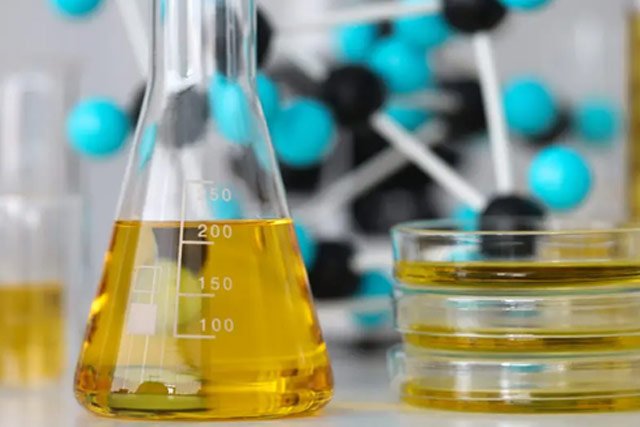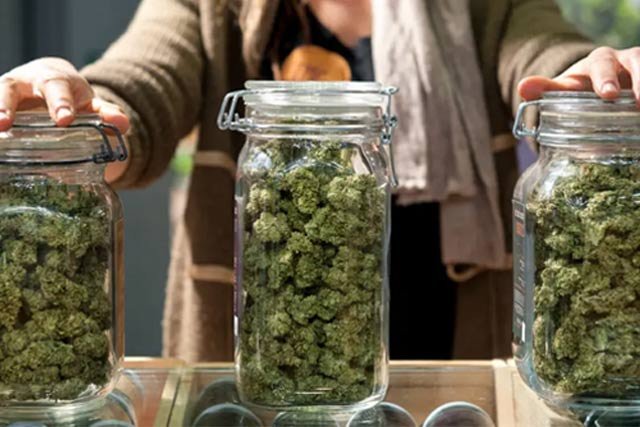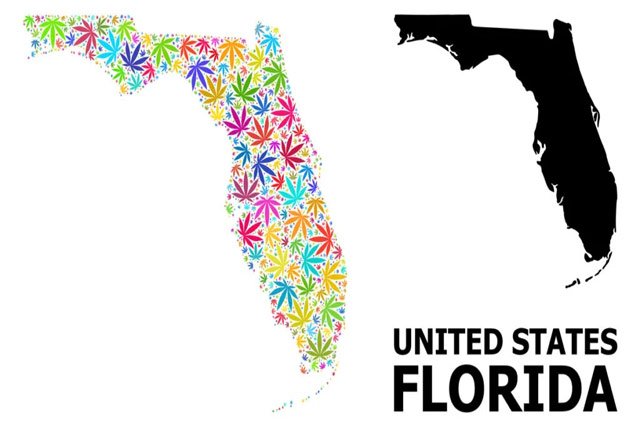The arrival of delta-8-THC (delta-8) products has been nothing short of a miracle for weed lovers who don’t live in legalized states. But several states are now cracking down on delta-8. Is Delta-8 legal in Florida? The state legalized delta-8 at the same time as the federal government, with the passage of the 2018 Agriculture Improvement Act (Farm Bill). You can purchase delta-8 products without needing a medical marijuana card.
However, it gets a little more complicated than that! In this guide, I’ll give you the lowdown on the delta-8 laws in Florida, look at why they’re legal, and discuss what the future may hold. There’s much to discuss, so let’s get to it.
1. Delta-8 State Law in Florida
Florida is one of many states that have followed the federal government’s lead on delta-8. Therefore, since delta-8 is legal at the federal level, it’s also legal in Florida.
However, Florida has gone further than some states, passing Senate Bill 1766 in 2022. The bill prohibited the sale of delta-8 products to people under 21. But in doing so, the bill also gave the all-clear for people over 21 to purchase delta-8.
This may surprise you. After all, even though Florida has a medical marijuana program, it still bans recreational marijuana. By allowing a delta-8 industry in Florida, state lawmakers are essentially permitting a legal marijuana market.
Florida legalized industrial hemp in 2014, but the delta-8 market didn’t spring up until 2018 when federal lawmakers passed the Farm Bill. Until then, uncertainties about what hemp products were allowed still existed.
The Farm Bill legalized the entire hemp plant, with a caveat that products could contain no more than 0.3% THC on a dry weight basis. The intention behind the cap was to stop the production of psychoactive hemp-based products.
Florida copied the Farm Bill word for word, legalizing all of the hemp plant’s derivatives, extracts, cannabinoids, acids, isomers, and salts of isomers. This full legalization of hemp created a legal loophole for companies to start manufacturing psychoactive delta-8 products.
2. Delta-8 Federal Law
When the federal government comprehensively legalized hemp in 2018, few expected it would lead to the creation of legal delta-8 products. The bill was mostly about giving the go-ahead to non-psychoactive cannabidiol (CBD) products, which had been in a legal gray area since 2014.
Indeed, if lawmakers had considered the potential for delta-8 and other legal psychoactive hemp-based products, they would have written the bill differently. For example, they could have capped all tetrahydrocannabinols at 0.3%, not just THC.
But few realized the potential of delta-8 at the time. While psychoactive, hemp plants produce delta-8 in such low quantities that the idea you could use it for psychoactive purposes was laughable.
However, that is precisely what has happened. Shortly after the federal government legalized hemp-based products, delta-8 vape juices, edibles, tincture oils, and cartridges started popping up in Florida and beyond.
Products became available online, in vape shops, and in other specialized stores, and delta-8 products quickly became a must-buy. Marijuana fans in Florida could scarcely believe their luck.
Now, the federal law couldn’t be more contradictory. On one hand, marijuana is a Schedule 1 controlled substance, classified in the same category as heroin. On the other, delta-8 – which is almost identical to THC both chemically and in terms of effects – is completely legal!
With marijuana legalization not on the federal government’s radar anytime soon, could the Drug Enforcement Administration (DEA) move to restrict access to delta-8?
3. Is Delta-8 Synthetic?

The DEA has yet to take any specific action on delta-8. However, some considered an Interim Final Rule (IFR) published in 2020 to address uncertainties concerning the 2018 Farm Bill to be a swipe at delta-8.
The IFR targeted “synthetic tetrahydrocannabinols,” unnatural compounds which mimic THC’s effects. The debate has recently raged over whether delta-8 products are natural or synthetic, with the manufacturing process under scrutiny.
You may be confused. Isn’t delta-8 a naturally occurring compound in hemp? And if so, what’s the problem? While delta-8 is a natural compound, making it in large quantities is arguably synthetic.
Hemp plants do not generate enough delta-8 for natural extraction to be financially viable. Hemp typically contains less than 1% delta-8, in contrast to more than 20% CBD.
To produce delta-8 naturally, 20 to 30 times more hemp is needed, driving costs up. To tackle this, manufacturers use a lab process called isomerization.
You can make delta-8 by exposing CBD-isolate extract to a mixture of hydrochloric acid and toluene. This interaction tweaks the chemical makeup of CBD, turning it into psychoactive delta-8. The mass production made possible by this process has allowed manufacturers to offer delta-8 at reasonable prices.
But the lab process isn’t without its critics, who have described it as synthetic and illegal. But delta-8’s defenders argue that the isomerization of CBD-isolate into delta-8 isn’t a synthetic operation. So, who’s right?
Firstly, despite being produced in a laboratory, delta-8 is hardly comparable to the more notorious synthetic tetrahydrocannabinols. Synthetic products like spice (K2) are 100% unnatural and made entirely in a lab. They are also much more dangerous than delta-8.
Sure, the manufacturing of delta-8 might not be natural. But the compound is made from natural CBD-isolate, and delta-8 is still a natural substance. That’s much different from spice, which does not exist anywhere in the natural world.
However, delta-8 products would simply not exist in the way they do if not for the unnatural isomerization process that CBD-isolate undergoes in the lab. There’s an argument that even though delta-8 is natural, the manufacturing process is synthetic, and any delta-8 products manufactured in this manner should be classed as such.
In my view, the law is unclear and open to interpretation. I agree that delta-8 is not a synthetic tetrahydrocannabinol in the typical sense. But delta-8 products are obviously not as natural as the hemp-based CBD products on the market today.
The current law just doesn’t cover products made via a mixture of natural and synthetic processes. And the DEA’s attempt to clear up confusion in the Farm Bill with the 2020 IFR has only made things worse and put the delta-8 industry on even more questionable ground.
4. The History of Delta-8 in Florida
Delta-8 has a relatively short history in the Sunshine State but has significantly impacted that period. You could make the case that delta-8 was legal in Florida until 1937, when the Marihuana Tax Act came into force.
All components of marijuana then became Schedule 1 substances in 1971 when the Controlled Substances Act came into effect.
But as we have covered, delta-8 was an unknown entity until recent years, existing as an obscure and largely irrelevant cannabinoid. However, since the federal government legalized hemp in 2018, a delta-8 industry has emerged in Florida.
Senate Bill 1766, which became effective on 1 July 2022, gave tactic acceptance to delta-8 products. Despite restricting products to those under 21, the bill clarified that delta-8 products are legal.
This is a step further than most states, where delta-8 is banned or exists in a gray area, with no specific legislation confirming its legal status.
5. The Legality of Selling Delta-8 in Florida
Delta-8 is legal to manufacture, possess, buy, and sell in Florida. However, retailers can only sell products to customers over the age of 21 due to Senate Bill 1766.
Buying delta-8 products safely in Florida

As with the rest of the hemp industry, the delta-8 market is not regulated by the Food and Drug Administration (FDA). When buying products from any unregulated industry, you must take extra precautions to ensure your purchase is safe and legitimate.
The absence of regulation means the delta-8 industry is rife with sketchy companies selling dodgy delta-8. Headshops and gas stations are notorious for stocking low-quality or fake hemp-based products.
In 2019-20, a vaping lung illness outbreak in the US caused by fake THC e-liquids containing vitamin E acetate led to more than 60 deaths and 2700 hospitalizations. This incident was a deadly reminder of the dangers of consuming products from shady brands.
You should always check that a third party has approved the product you are considering. With no official regulatory body to provide assurances on product safety and quality, delta-8 companies must prove their products are the real deal by getting them tested by independent laboratories.
Third-party testing exposes brands acting in bad faith. Since there is no way an illegitimate or fake product could pass scrutiny, these companies will do everything to avoid independent tests.
Some brands may claim their products are third-party tested. But I suggest you stay very skeptical unless you actually see any results. With so many legit delta-8 brands, you do not need to mess around with companies using questionable business practices.
6. Delta-8’s Future in Florida
As it does everywhere else in the US, delta-8 products face a challenging future in Florida. Ultimately, the emergence of what is effectively a legal weed market in a prohibited state has not gone unnoticed or without controversy.
But compared to other states, delta-8’s future looks a little more secure in Florida thanks to Senate Bill 1766. However, while state lawmakers aren’t eyeing an imminent ban, nothing stops the DEA from swooping in.
The IFR ruling on synthetic tetrahydrocannabinols has led many to believe that the DEA has delta-8 products in its crosshairs. The IFR ruling may not have ended the delta-8 industry, but if the DEA is looking for blood, the agency could stamp out the market as quickly as it emerged, including in Florida.
Of course, Florida state or the federal government could move to legalize recreational marijuana at some stage – polls indicate the public strongly support full legalization.
In this event, the need for delta-8 would reduce significantly overnight. The industry would have served its purpose for most, who would undoubtedly switch to regular marijuana products.
It’s impossible to say exactly what will happen to delta-8 products in Florida and elsewhere.
More than a dozen states have banned delta-8, but the federal government’s inaction has saved the industry until now in states that haven’t enforced anti-delta-8 laws. Keep your eyes peeled on what the DEA has to say about synthetic cannabinoids going forward.




